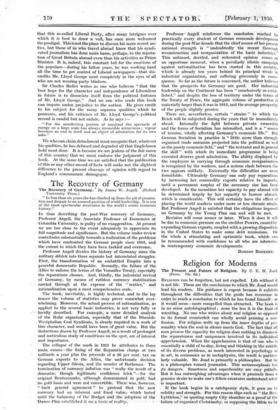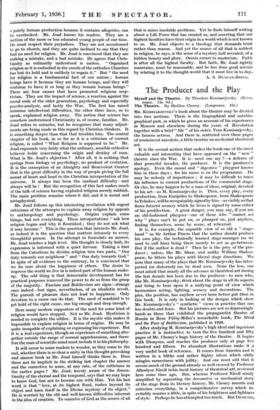Religion for Moderns
The Present and Future of Religion. By C. E. M. Joad. (Benn. 10s. 6d.)
RELIGION can be forgotten, but not expelled. Life.without it is not life. These are the conclusions to which Mr. Joad would lead his readers. His guidance is cogent bec-ause it exhibits throughout the difficulties that the guide has overcome in order to reach a conclusion to which 'he has found himself—as it wouldseeni—more conipelled than attracted. The book is in no sense autobiographical ; none the less it is the fruit of Wrestling. 'No one who writes about real religion as opposed to its formal counterfeit can wholly avoid penning a con- fession. For religion wells up from the inner depths of per- sonality when the soul in silence meets God. The fact that all men possess the capacity for religion does nothing to diminish the separateness and uniqUeness involVed in its individual apprehension. When the apprehension is that of one who is essentially a child of to-day, living and thinking in the middle of its diverse problems, as much interested in psychology as in art, in economics as in metaphysics, the result is particu- larly valuable. Mr. Joad is primarily a philosopher. But he is a philosopher turned journalist. This metamorphosis has its dangers. Smartness and. superficiality are easy pitfalls. But it has outweighing advantages when it proCeeds from a genuine desire to make one's fellow-creatures understand what is' important.
If the book begins in a catchpenny style, it goes on to solidity and strength. 'For this reason slips such as " the Rev. LyttletOn,!' or quoting empty City churches as a proof of the 'failure of Organized; Christianity, or supposing the Bible to be
a purely human production because it contains allegories, can be overlooked. Mr. Joad knows his readers. They are a section of the more or less educated young people of our time. He must respect their prejudices. They are not accustomed to go to church, and they are quite inclined to say that they find no need for religion. Mr. Joad is convinced that they are making a mistake, and a bad mistake. He agrees that Chris-. tianity as ordinarily understood is useless. " Organized religion as it is embodied in the creeds of the orthodox Churches has lost its hold and is unlikely to regain it." But " the need for religion is a fundamental fact of our nature ; human beings have it because they are human beings, and they will continue to have it so long as they remain human beings." There are four causes that have promoted religious scep- ticism. They are the impact of science, a reaction against the moral code of the older generation, psychology and especially psycho-analysis, and lastly the War. The first has raised immense intellectual difficulties, the other three have, so to speak, explained religion away. The notion that science has somehow undermined Christianity is, of course, familiar. Mr. Joad refers to miracles, but he recognises that many adjust- ments are being made in this regard by Christian thinkers. It is something deeper than that that troubles him. The central chapter of his book, in so far as it is a criticism of current religion, is called " What Religion is supposed to be." Mr. Joad expounds very fairly what the ordinary, sensible orthodox believer holds concerning the origin and destiny of man. What is Mr. Joad's objection ? After all, it is nothing that springs from biology or psychology, no product of evolution. It is the conception of an Almighty and Benevolent Creator that is the great difficulty in the way of people giving the full assent of heart and head to the Christian interpretation of the universe. It always has been the cardinal difficulty—and always will be ! But the recognition of this fact makes much of the talk of science having exploded religion merely rubbish. The main problem remains where it did, and it is moral and metaphysical.
Mr. Joad follows up this interesting revelation with cogent criticisms of the attempts to explain away religion by appeals to anthropology and psychology. Origins explain some things, but not everything.. These interpretations " ask how religion began and why it flourished ; they do not ask what it may become." This is the question that interests Mr. Joad, as indeed it is the question that matters intensely to every thoughtful person. In the attempt to formulate an answer, Mr. Joad reaches a high level. His thought is closely knit, its expression is informed with a quiet fervour. Taking a hint from the Catechism he divides religion into two parts, " Our duty towards our neighbour " and " Our duty towards God." In spite of all evidence to the contrary, he is convinced that we do care about the happiness of others. The desire to improve the world we live in is indeed part of the human make- up. The odd thing is that democratic development has for practical purposes removed the power to do so from the grasp of the majority. Fascism and Bolshevism are signs—strange ones indeed—but signs, nevertheless, of an idealistic revolt. The pursuit of pleasure does not lead to happiness. Only devotion to a. cause can do that. The need of mankind is to get hold of the right cause, one big enough and deep enough.
Here many modem supporters of the need for some kind of religion would have stopped. Not so Mr. Jowl. Mysticism is needed_to complete the edifice.. It is the mystic who makes it impossible to explain religion in terms of origins. He may be quite incapable of explaining or expressing his experience. But it is a real experience, though an experience of something alto- gether outside the range of normal apprehensions, and there- fore the man of scientific mind must include it in his philosophy.
It will occur to some readers to wonder, as they come to the end, whether there is so clear a unity in this thought-provoking and sincere book as Mr. Jowl himself thinks there is. Does there not lie implicit in the striking last chapter the answer and the corrective to some, at any rate, of the criticisms in the earlier pages ? Mr. Jowl, keenly aware of the discon- tinuity of the eternal and the temporal, says that we may hope to know God, but not to become one with Him. Yet his last word is that " love, at its highest flood, rushes beyond its object and loses itself in the Divine mystery of its object." He is worried by the old and well-known difficulties inherent in the idea of creation. To conceive of God. as the source of all
that is raises insoluble problems. Yet he finds himself writing about a Life Force that has created us, and asserting that our highest faculties have their origin in a world which is not known to us. Mr. Jowl objects to a theology that demands trust rather than reason. And yet the source of all that is noblest in religion, he says, is the sense of a mystery half revealed, of a hidden beauty and glory. Omnia exeunt in in yaierium. Faith is after all the highest faculty. But faith, Mr. Jowl rightly maintains; must be reasonable, and he has done good service by relating it to the thought-world that it must live in to-day.
A. S. DuszcAs-Josms.







































 Previous page
Previous page